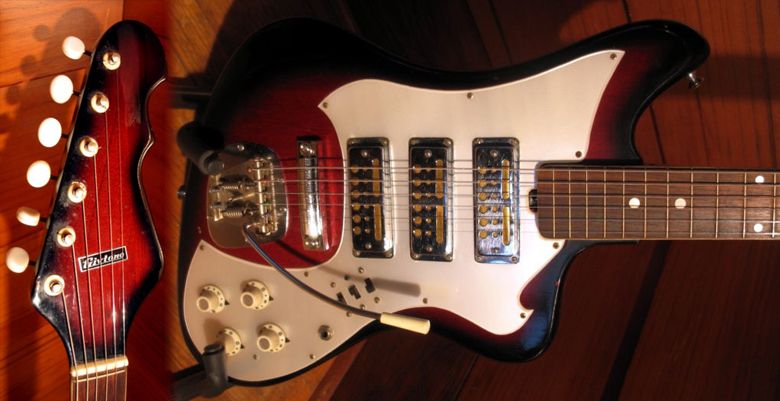The Givtone name is almost certainly a department store/catalogue brandname. The seller rather lazily refers to this guitar as probably being a Teisco as if they were the only producers of Japanese electric guitars in that period. I'd say it looks more like a Zen-on/Zenon or Morales, maybe even Kawai or Guyatone, although I concede that the neck does look Teisco-like with its very narrow fretwire (maybe just a fashion of the era), but other Teisco trademarks such as offset block fingerboard inlays and striped metal pickguard are absent.
As, to it being a baritone, I feel this is unlikely. The seller states that:
Guitars like this, with a 26.5" scale, are usually tuned to Low "B" in between a guitar and bass but it'll hold up if you want to go lower or even higher.Well, as I've said before, my understanding is that "baritone" tunings somewhere between a guitar and bass are a relatively modern concept. On a vintage guitar such as this, they'd more likely be tuned down a whole octave a la Bass VI. However, for a Bass VI, I would have expected a slightly longer scale length, maybe 28" or preferably 30". I have to wonder if this was simply a long scale guitar intended for regular tuning?
By the way, the earliest reference I can find to baritone guitars being used is in the Wikipedia entry for the Fender Bass VI, which says:
In the late 1960s some artists used heavy guitar strings with resp. length and tuned the Bass VI to a baritone guitar from 'B to b' or 'A to a'. With this 'down and dirty' sound the Fender VI enriched 'Indo-Rock' bands with their unique Rock & Roll sound. One of those players was Reggy Tielman from the 'Tielman Brothers'.Note that whilst these guys were using baritone tunings, the instrument they were using was built as a Bass VI.
Just to confuse things, the Wikipedia entry for "baritone guitar", states that:
The Danelectro Company was the first to introduce the electric baritone guitar in the late 1950s, and the instrument began to appear in surf music, as well as background music for many movie soundtracks, especially spaghetti westerns.The confusion comes in here because the modern name "baritone guitar" is being applied retrospectively to the Bass VI, the term being incorrectly used here so as to distinguish the original six-string bass from the modern variant typically with a low B string and high C string, 34" scale and proper bass string spacing.
But maybe you know different and there was an earlier precedent for dedicated baritone guitars being made in the 1960s. Because of the mixed terminology being used it is very difficult to find out the absolute truth of the matter.
G L Wilson
© 2011, Guitarz - The Original Guitar Blog - now in its 10th year!

0 comments:
Post a Comment